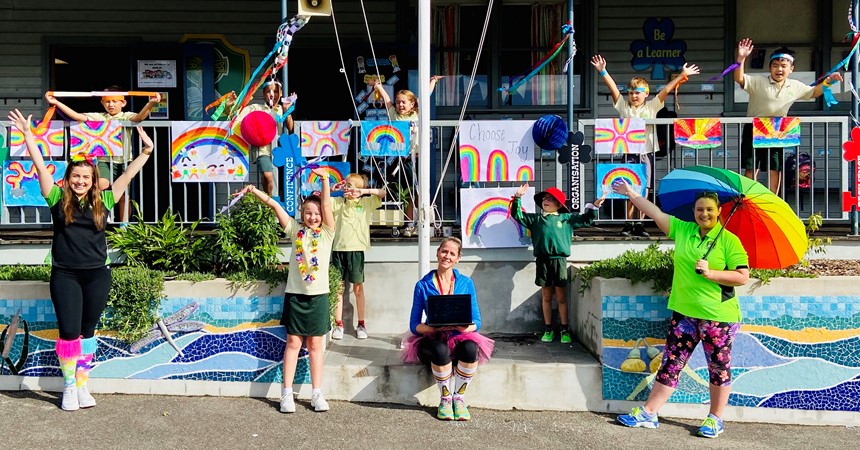“Today I believe we have to slow down our rate of production and consumption and to learn to understand and contemplate the natural world. We need to reconnect with our real surroundings. This is the opportunity for conversion.”
Any suggestion the pandemic has been a good thing is unlikely to be well received by the public. Taking a global view, COVID-19 has caused thousands of deaths and made many people extremely ill. Unemployment has skyrocketed and we are facing a global economic downturn that could last years. The speed with which the crisis has unfolded has left the community stressed, anxious and struggling to adapt to a troubling new reality.
Fortunately, our local communities have not been severely impacted by a major outbreak. Still, with daily news reports focusing on death and infection rates it can be challenging to find the light among the darkness.
While we must be mindful of the risks to our mental health, good things are still happening and it's no sin to point them out and be thankful. For let us not forget that our Christian tradition centres on modelling our lives on Jesus’s values, and that they offer us a way through hardship.
Now more than ever it’s important to identify things for which we are grateful, particularly our teachers, doctors, nurses, pharmacists, grocery store workers, garbage collectors, cleaners, and many more — who have kept our society going.
For some the consequences of COVID-19 has been limited to a disruption of their normal routine. While government-enforced regulations regarding social distancing came as a shock initially, Australians now realise we can make sacrifices for the greater good. And, as the Pope points out, there is opportunity for conversion that comes from this.
The past few months have provided a chance to discover new ways to connect with ourselves and our families. In an era when most Australian families have both parents working, either full or part-time, spending any length of time together has become a rarity. Working from home, while also taking care of and attempting to educate children, has its challenges. And yet the abundance of time together is also rare and precious.
For many, being cooped up in their homes has birthed a love for new hobbies or a chance to revisit childhood pastimes. Walking the streets, the sound of laughter bursts through the front doors of many homes where families are playing together with their pets, baking treats and generally delighting in each other's company.
Out on the footpaths, now adorned with chalk murals created by enthusiastic children sharing messages of hope, couples of all ages are walking in the sunshine. Spotting teddy bears left in windows by neighbours has become a popular pastime, as has taking the time to greet each other from afar.
In fact, with many travelling far less in cars for work or pleasure, having extra time to spend in the great outdoors is a blessing in itself. The immensity of the outdoors provides the sense that, despite all the current adjustments and difficulties, nature continues, unabated.
As a result of the pandemic and associated restrictions, pollution around the world is the lowest it has been in years. With fewer vehicles on the roads, and planes grounded, the environment is breathing easier. Overseas, Venice's canals are clearer than they've been in decades, skyscrapers in China that were once shrouded in smog are now visible, and closer to home, our beaches- now closed for recreation- have never been more clear of rubbish, nor adorned with shells and wildlife.
Enjoying a laugh over Zoom with extended family or Face Timing with mates will never compare to a warm hug, but remaining connected online has offered far more comfort than many would have thought possible. The very apps we scold for being harmful to our collective lives during regular times are now our very lifelines to loved ones. It may be that the virus is forcing us to use the internet as it was always intended — to connect, share information and resources, and come up with collective solutions to urgent problems. Of course, not everyone has access to the internet, and so it is important that we make an extra effort to stay connected with these people by rediscovering the joy of handwritten letters or picking up the telephone to say ‘hello.’
Schools across the Diocese, and further afield, have adapted to the disruption masterfully. Teachers and students alike are embracing the transition from the comfort of their lounge rooms, and while improvements will continue to be made it has certainly helped imagine what's possible and given a lesson in resilience.
Technological advances have not been limited to our computer screens, with scientists around the world, including those at the Hunter Medical Research Institute, working frantically to come up with a vaccine for COVID-19. In some reports they appear to be getting closer but the public has also been frequently warned that a vaccine may never be found. If that is the case it will take even greater ingenuity and goodwill by the global community to live with this virus long term. The pandemic has exposed shortcomings in healthcare systems throughout the world, but also provided an opportunity to improve them. Although bittersweet, we can be glad the pandemic has instilled good hand hygiene habits among millions worldwide and thankful that most people with the virus have been able to recover.
Ironically, for many, government-mandated social distancing has enabled them to rediscover their need for others. This crisis, as with the bushfires a few months ago, has revealed the resilience of the human spirit and the extent to which people will go to help each other, even at considerable risk. It’s uplifting to hear stories of volunteers putting their skills to use sewing medical masks for local health workers or uniting to deliver meals to the vulnerable.
There are still a lot of unknowns about the virus and its wide-reaching impacts, but one thing is certain: it will change our world forever. This pandemic has brought about an opportunity to demonstrate what’s possible if we all unite for the common good. The real hope is that the positive changes enacted by our collective response to the virus, most importantly, compassion for each other, remain long after the pandemic passes.
COVID-19 has brought with it many changes and challenges to our society. Kelly Pavan, a psychologist with CatholicCare Social Services Hunter-Manning has said that it is expected people may be feeling more stressed, confused and frightened than usual at this time.
If you are feeling anxious or overwhelmed Ms Pavan recommends staying connected with others virtually or over the phone, prioritising adequate sleep, exercising regularly, eating healthy food, participating in relaxing activities and avoiding news and social media if they make you anxious.
“If these strategies don’t assist in reducing anxiety or stress, I recommend reaching out to a professional for help. This pandemic is like no other experience we’ve ever faced before, and there’s no harm in talking with a professional to help develop coping mechanisms,” Ms Pavan said.
For confidential mental health support call the 24-hour Lifeline crisis support on 13 11 14 or contact CatholicCare during office hours on 4979 1120 to arrange a video conferencing or telephone appointment.




























































































